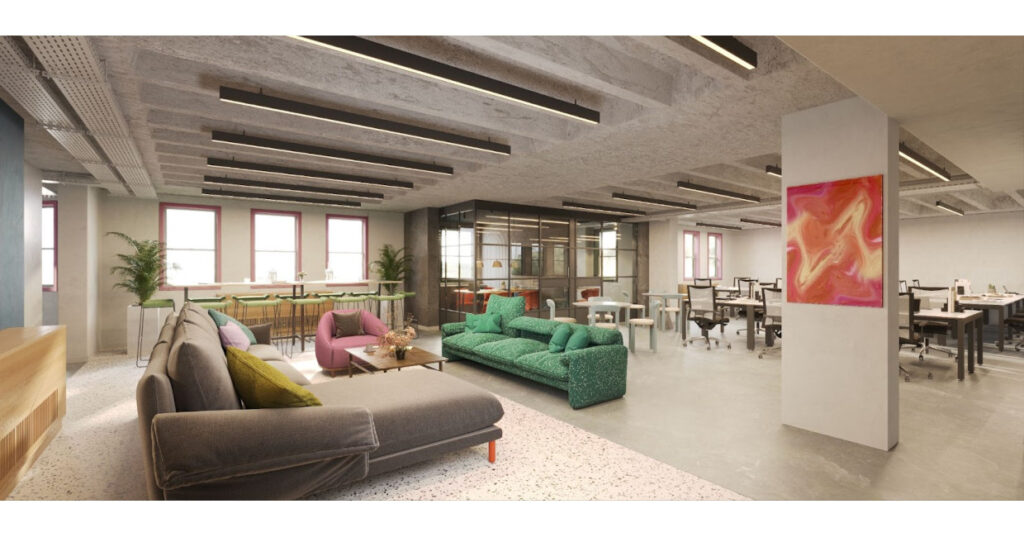Fresh off the opening of Huckletree Oxford Circus (which is already at 80% occupancy), the leading innovator in curated co-working spaces, Huckletree, has announced it is moving to two of London’s most enviable postcodes: Liverpool Street and Kensington as part of expansion plans, taking their total footprint to over 250,000 square feet in the UK and Ireland.
Huckletree has achieved remarkable results by carefully selecting a diverse range of innovative companies and providing them with an environment that fosters growth and connectivity. Their unique approach has been key to their incredible success over the past decade. Most recently Huckletree launched a new hub in London’s Oxford Circus dedicated to serving Web3 andAI companies scaling across the capital, and is home to industry leaders and scaling startups including SurrealDB who raised $6M for its database-as-a-service offering in January.
Using ‘The Huckletree effect’ as a blueprint, the company is now expanding its London footprint into sought-after areas including Kensington and Liverpool Street, as it looks to tap into businesses and entrepreneurial communities that are evolving the landscape of these neighbourhoods. For example, Kensington is no longer focused solely on retail and is becoming a cultural hub once again with the opening of the design museum and Japan House, as well as new plans for Kensington Olympia. Alongside the Canary Wharf exodus, Liverpool Street is now set to receive a fresh wave of technology and FinTech firms.
The next two openings are part of Huckletree’s wider expansion plans to launch an additional 140,000 square feet of space within the next 12 months. They coincide with London being identified as the world’s number one co-working city, out-scoring other global cities such as Lisbon for those looking for flexible working patterns. Huckletree also operates in Manchester and Dublin and is looking to grow footprint in both of these cities also due to increased demand as they grow as thriving locations for innovation and co-working.
Coming this September, Huckletree Liverpool Street will span four floors (35,000 square feet) of newly refurbished, highly sustainable 199 Bishopsgate building. Looking to attract up to 50 businesses the space will cater for a thriving neighbourhood of FinTech and other innovative players. Hot on the coattails of Liverpool Street, Huckletree Kensington will open its doors in early 2024 and will bring six floors of turnkey, flexible office space to the iconic West London neighbourhood. Taking over a free-standing building by Kensington High Street tube station, Huckletree aims for their Kensington hub to develop into the epicentre of innovation within the Royal Borough. As a longstanding neighbourhood for creativity, intellectual entertainment and transformative technology, as well as being the home of the capital’s music industry and world-class cultural locations; Kensington is an exciting location for the Huckletree brand. The upcoming hub promises barista coffee and a rooftop lounge bar.
Both spaces are designed for modern styles of working and have a range of state of the art amenities including member lounges, rooftop terraces, dedicated wellness spaces and town hall areas.
Members of all Huckletree spaces have access to tailored programming that includes Huckletre’s ‘Founder Circles’ and workshop sessions with leading experts, as well as a network of venture capital investors. With a growing community of now 75+ global ambassadors, 100+ venture partners, 4000+ members and 1,500+ alumni; the Huckletree ecosystem sets the business apart, and goes beyond being just a physical office space.
Gabriela Hersham, Co-Founder and CEO of Huckletree said: “As a company dedicated to supporting business growth and building amazing spaces where people feel happy to come to work, we are incredibly excited by our upcoming expansion into two of London’s most enviable postcodes. This growth will allow us to build an innovation community in Kensington and support the burgeoning fintech ecosystem around Liverpool Street. Our current network of hubs across London, Manchester and Dublin is testament to the infrastructure that we have built since we launched in 2014 – we are looking forward to welcoming more disruptor businesses across London, the world’s innovation capital.”



